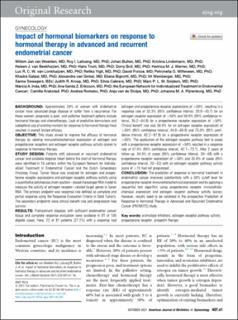| dc.contributor.author | van Weelden, Willem Jan | |
| dc.contributor.author | Lalisang, Roy I | |
| dc.contributor.author | Bulten, Johan | |
| dc.contributor.author | Lindemann, Kristina Yvonne Kathe | |
| dc.contributor.author | van Beekhuizen, Heleen J. | |
| dc.contributor.author | Trum, Hans | |
| dc.contributor.author | Boll, Dorry | |
| dc.contributor.author | Werner, Henrica Maria Johanna | |
| dc.contributor.author | Lonkhuijzen, Luc R C W van | |
| dc.contributor.author | Yigit, Refika | |
| dc.contributor.author | Forsse, David | |
| dc.contributor.author | Witteveen, Petronella O | |
| dc.contributor.author | Galaal, Khadra | |
| dc.contributor.author | van Ginkel, Alexandra | |
| dc.contributor.author | Bignotti, Eliana | |
| dc.contributor.author | Weinberger, Vit | |
| dc.contributor.author | Sweegers, Sanne | |
| dc.contributor.author | Kroep, Judith R. | |
| dc.contributor.author | Cabrera, Silvia | |
| dc.contributor.author | Snijders, Marc P.L.M. | |
| dc.contributor.author | Inda, Márcia A | |
| dc.contributor.author | Eriksson, Ane Gerda Zahl | |
| dc.contributor.author | Krakstad, Camilla | |
| dc.contributor.author | Romano, Andrea | |
| dc.contributor.author | Stolpe, Anja van de | |
| dc.contributor.author | Pijnenborg, Johanna M.A. | |
| dc.date.accessioned | 2022-04-22T08:40:37Z | |
| dc.date.available | 2022-04-22T08:40:37Z | |
| dc.date.created | 2022-03-18T09:37:35Z | |
| dc.date.issued | 2021 | |
| dc.identifier.issn | 0002-9378 | |
| dc.identifier.uri | https://hdl.handle.net/11250/2992167 | |
| dc.description.abstract | Background
Approximately 20% of women with endometrial cancer have advanced-stage disease or suffer from a recurrence. For these women, prognosis is poor, and palliative treatment options include hormonal therapy and chemotherapy. Lack of predictive biomarkers and suboptimal use of existing markers for response to hormonal therapy have resulted in overall limited efficacy.
Objective
This study aimed to improve the efficacy of hormonal therapy by relating immunohistochemical expression of estrogen and progesterone receptors and estrogen receptor pathway activity scores to response to hormonal therapy.
Study Design
Patients with advanced or recurrent endometrial cancer and available biopsies taken before the start of hormonal therapy were identified in 16 centers within the European Network for Individualized Treatment in Endometrial Cancer and the Dutch Gynecologic Oncology Group. Tumor tissue was analyzed for estrogen and progesterone receptor expressions and estrogen receptor pathway activity using a quantitative polymerase chain reaction–based messenger RNA model to measure the activity of estrogen receptor–related target genes in tumor RNA. The primary endpoint was response rate defined as complete and partial response using the Response Evaluation Criteria in Solid Tumors. The secondary endpoints were clinical benefit rate and progression-free survival.
Results
Pretreatment biopsies with sufficient endometrial cancer tissue and complete response evaluation were available in 81 of 105 eligible cases. Here, 22 of 81 patients (27.2%) with a response had estrogen and progesterone receptor expressions of >50%, resulting in a response rate of 32.3% (95% confidence interval, 20.9–43.7) for an estrogen receptor expression of >50% and 50.0% (95% confidence interval, 35.2–64.8) for a progesterone receptor expression of >50%. Clinical benefit rate was 56.9% for an estrogen receptor expression of >50% (95% confidence interval, 44.9–68.9) and 75.0% (95% confidence interval, 62.2–87.8) for a progesterone receptor expression of >50%. The application of the estrogen receptor pathway test to cases with a progesterone receptor expression of >50% resulted in a response rate of 57.6% (95% confidence interval, 42.1–73.1). After 2 years of follow-up, 34.3% of cases (95% confidence interval, 20–48) with a progesterone receptor expression of >50% and 35.8% of cases (95% confidence interval, 20–52) with an estrogen receptor pathway activity score of >15 had not progressed.
Conclusion
The prediction of response to hormonal treatment in endometrial cancer improves substantially with a 50% cutoff level for progesterone receptor immunohistochemical expression and by applying a sequential test algorithm using progesterone receptor immunohistochemical expression and estrogen receptor pathway activity scores. However, results need to be validated in the prospective Prediction of Response to Hormonal Therapy in Advanced and Recurrent Endometrial Cancer (PROMOTE) study. | en_US |
| dc.language.iso | eng | en_US |
| dc.publisher | Elsevier | en_US |
| dc.rights | Attribution-NonCommercial-NoDerivatives 4.0 Internasjonal | * |
| dc.rights.uri | http://creativecommons.org/licenses/by-nc-nd/4.0/deed.no | * |
| dc.title | Impact of hormonal biomarkers on response to hormonal therapy in advanced and recurrent endometrial cancer | en_US |
| dc.type | Journal article | en_US |
| dc.type | Peer reviewed | en_US |
| dc.description.version | publishedVersion | en_US |
| dc.rights.holder | Copyright 2021 The Author(s) | en_US |
| cristin.ispublished | true | |
| cristin.fulltext | original | |
| cristin.qualitycode | 2 | |
| dc.identifier.doi | 10.1016/j.ajog.2021.05.007 | |
| dc.identifier.cristin | 2010731 | |
| dc.source.journal | American Journal of Obstetrics and Gynecology | en_US |
| dc.source.pagenumber | 407.e1-407.e16 | en_US |
| dc.identifier.citation | American Journal of Obstetrics and Gynecology. 2021, 225 (4), 407.e1-407.e16. | en_US |
| dc.source.volume | 225 | en_US |
| dc.source.issue | 4 | en_US |

